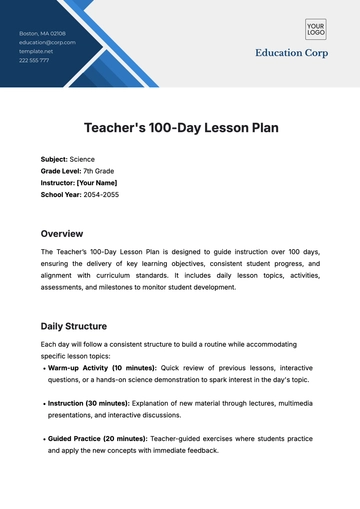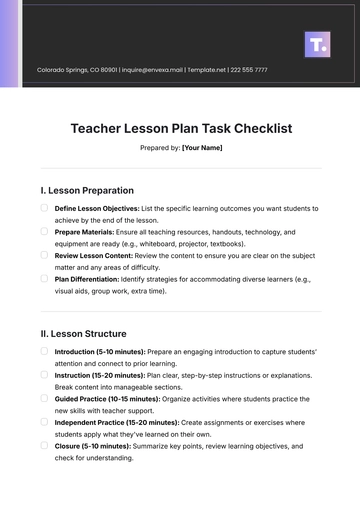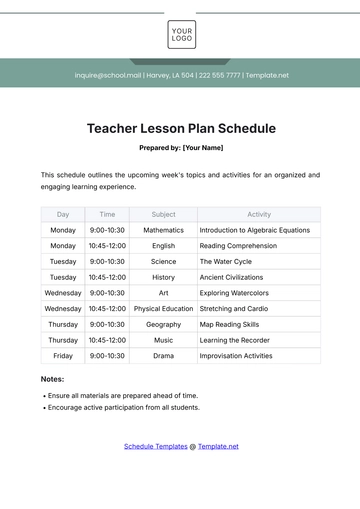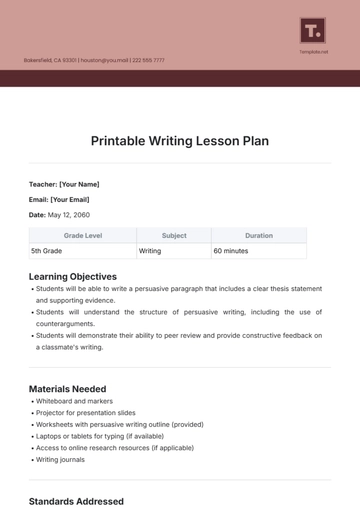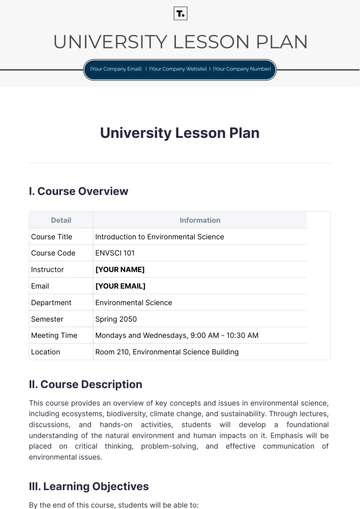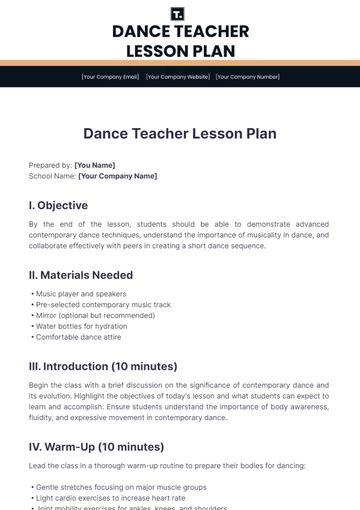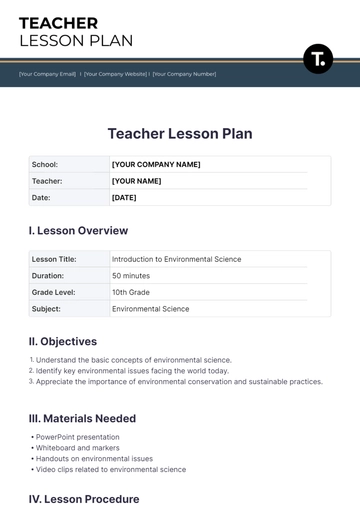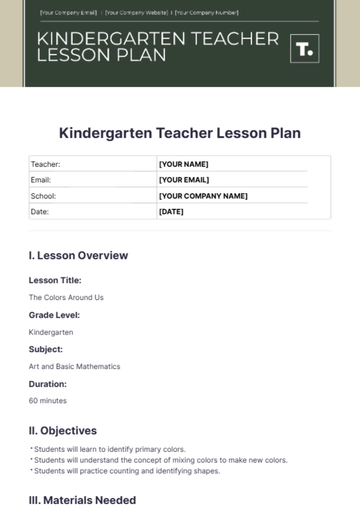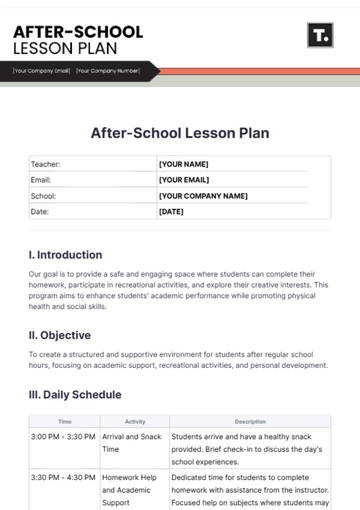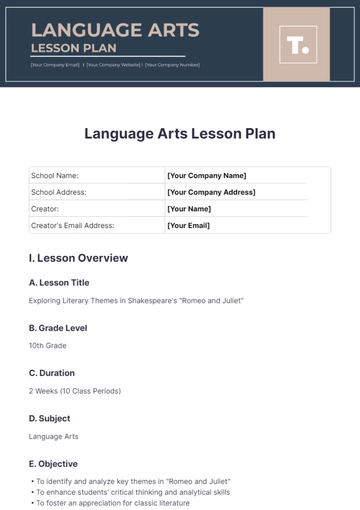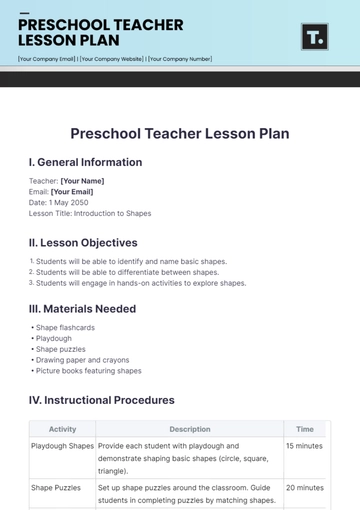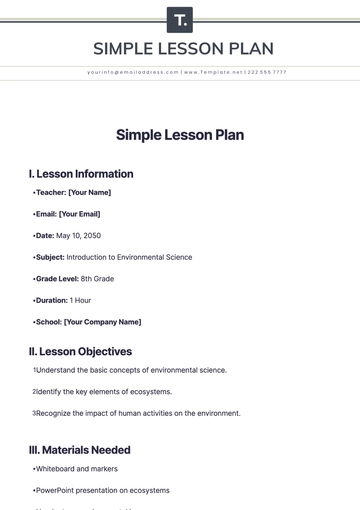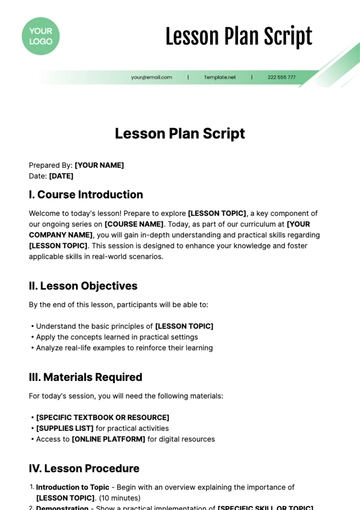Free Teachers 100-Day Lesson Plan

Subject: Science
Grade Level: 7th Grade
Instructor: [Your Name]
School Year: 2054-2055
Overview
The Teacher’s 100-Day Lesson Plan is designed to guide instruction over 100 days, ensuring the delivery of key learning objectives, consistent student progress, and alignment with curriculum standards. It includes daily lesson topics, activities, assessments, and milestones to monitor student development.
Daily Structure
Each day will follow a consistent structure to build a routine while accommodating specific lesson topics:
Warm-up Activity (10 minutes): Quick review of previous lessons, interactive questions, or a hands-on science demonstration to spark interest in the day's topic.
Instruction (30 minutes): Explanation of new material through lectures, multimedia presentations, and interactive discussions.
Guided Practice (20 minutes): Teacher-guided exercises where students practice and apply the new concepts with immediate feedback.
Independent Work (20 minutes): Individual assignments or group work to reinforce the day's lesson, such as worksheets or small group experiments.
Wrap-Up & Reflection (10 minutes): Review key takeaways, answer lingering questions, and assign homework related to the day's lesson.
Sample Weekly Plan Overview
Week 1 - Introduction to Science and Scientific Method
Day 1: Introduction to Science and the Scientific Method
Goal: Introduce students to the fundamentals of science and the scientific method.
Activities: Group discussion on the nature of science, review of key terms (hypothesis, experiment, data).
Assessment: Short quiz on scientific method steps, class participation.
Day 2: Formulating Hypotheses and Designing Experiments
Goal: Teach students how to create a testable hypothesis and design an experiment.
Activities: Guided activity on creating hypotheses, experiment design template.
Assessment: Group activity submission, peer review.
Day 3: Conducting Simple Experiments
Goal: Apply the scientific method through simple experiments.
Activities: Hands-on experiment using everyday materials (e.g., plant growth under different light conditions).
Assessment: Lab report submission.
Day 4: Data Collection and Analysis
Goal: Learn how to collect and analyze data from experiments.
Activities: Analyze results from previous day’s experiment, graphing data.
Assessment: Data analysis worksheet, class discussion.
Day 5: Reflection and Review
Goal: Review the scientific method and its application.
Activities: Group reflection on the experiment and data analysis.
Assessment: Reflection journal, group presentation on experimental results.
Week 2-4 - Exploring Biology
Day 10: Cells and Their Functions
Goal: Introduce students to cell structure and functions.
Activities: Diagrams of plant and animal cells, virtual microscope tour.
Assessment: Worksheet on cell parts and their functions, class discussion.
Day 15: Photosynthesis and Cellular Respiration
Goal: Teach students the process of photosynthesis and cellular respiration.
Activities: Interactive lesson on plant biology, create a diagram of the processes.
Assessment: Quiz on photosynthesis and cellular respiration.
Day 20: Genetics and Heredity
Goal: Introduce basic genetic concepts like inheritance and genes.
Activities: Punnett square practice, traits analysis.
Assessment: Homework assignment on heredity patterns.
Day 25: Evolution and Natural Selection
Goal: Explore the concept of evolution and natural selection.
Activities: Video on Darwin’s finches, group discussions on adaptation.
Assessment: Group project on evolutionary examples.
Week 5-10 - Diving into Chemistry
Day 30: Introduction to Elements and the Periodic Table
Goal: Teach students about chemical elements and their arrangement in the periodic table.
Activities: Create a class periodic table, interactive matching activity.
Assessment: Quiz on periodic table elements, written reflection.
Day 35: Chemical Reactions and Bonding
Goal: Explain types of chemical reactions and how atoms bond.
Activities: Hands-on experiment with vinegar and baking soda, diagramming chemical bonds.
Assessment: Lab report on chemical reactions.
Day 40: Acids, Bases, and pH Scale
Goal: Introduce acids, bases, and the pH scale.
Activities: Testing household substances with litmus paper, discussion on pH.
Assessment: Lab sheet, pH scale quiz.
Day 45: Energy and Chemical Reactions
Goal: Discuss how energy is involved in chemical reactions.
Activities: Energy transfer demonstrations, creating simple exothermic and endothermic reactions.
Assessment: Worksheet on energy types, quiz on reaction types.
Week 11-15 - Introduction to Physics
Day 50: Motion and Forces
Goal: Introduce the basic concepts of motion and forces.
Activities: Demonstrations with toy cars, rolling down ramps.
Assessment: Worksheet on types of forces, motion experiment.
Day 55: Newton’s Laws of Motion
Goal: Teach Newton’s three laws of motion.
Activities: Hands-on activities illustrating each law (e.g., inertia with a tablecloth pull).
Assessment: Quiz on Newton's Laws, lab write-up.
Day 60: Energy Forms and Conservation
Goal: Explain different forms of energy and the law of conservation of energy.
Activities: Group activity on energy transformations (e.g., potential to kinetic).
Assessment: Energy transformation project.
Week 16-20 - Earth Science Concepts
Day 75: Earth’s Layers and Plate Tectonics
Goal: Introduce Earth’s structure and tectonic plate movement.
Activities: Interactive map of tectonic plates, model-building of Earth layers.
Assessment: Quiz on Earth’s structure, plate tectonics worksheet.
Day 80: Weather and Climate
Goal: Understand the difference between weather and climate and how they affect the Earth.
Activities: Collect local weather data for a week, create a climate chart.
Assessment: Weather data collection and analysis.
Day 85: The Water Cycle
Goal: Teach students about the water cycle and its processes.
Activities: Visual representation of the water cycle, hands-on demonstration.
Assessment: Water cycle diagram project.
Day 90: Natural Resources and Conservation
Goal: Discuss renewable and nonrenewable resources and their conservation.
Activities: Class debate on resource usage, group project on conservation methods.
Assessment: Conservation campaign project presentation.
Week 21-25 - Review and Final Assessment
Day 95: Comprehensive Review of Key Concepts
Goal: Recap all major topics covered: biology, chemistry, physics, and earth science.
Activities: Group review sessions, Q&A.
Assessment: Review test.
Day 100: Final Project Presentations
Goal: Present final projects covering a topic from the entire 100-day period.
Activities: Student presentations, peer evaluations.
Assessment: Final project grading, peer reviews.
Assessment and Evaluation
Formative Assessments: Daily quizzes, participation, and group activities.
Summative Assessments: Mid-term and final exams, final project.
Self-Assessment and Reflection: Weekly reflection journals, peer feedback on projects.
Additional Notes
Homework: Assigned after every lesson to reinforce key concepts, usually a combination of reading and practice problems.
Differentiation: Extra support is provided for students who need it, including more visual aids and extended time for assessments.
Materials Needed: Science lab materials (e.g., beakers, microscopes), interactive whiteboard, handouts, and online resources.
- 100% Customizable, free editor
- Access 1 Million+ Templates, photo’s & graphics
- Download or share as a template
- Click and replace photos, graphics, text, backgrounds
- Resize, crop, AI write & more
- Access advanced editor
The Teachers 100-Day Lesson Plan Template from Template.net is an editable and customizable tool designed to streamline lesson planning. Fully editable in our Ai Editor Tool, this template allows educators to personalize schedules, set objectives, and track progress, ensuring a well-organized and effective teaching strategy for the first 100 days of the school year.
